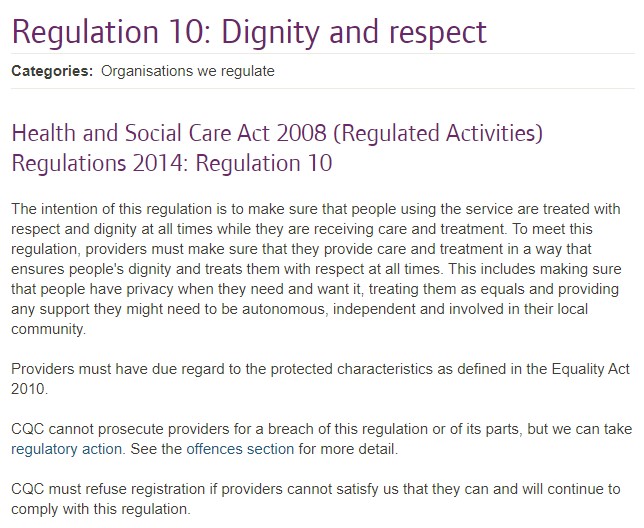In a previous blog we discussed the nature of the fundamental standard which covers person-centred care and discussed a little about why it is a fundamental standard and how to enact it in the care sector. In this blog, we will look at the fundamental standard which covers dignity and respect.
All providers of health and social care believe we know what dignity is, but few can define it. Many of us think dignity is about treating others as we would like to be treated but there is a fundamental problem with this idea, different people like to be treated differently. One simple example of this is the use of names, some people like to be called by their first name and others by a nickname or as Mr, Mrs or Miss.
The other issue is that we design health and social care practices in such a way that it is hard sometimes for them to be dignified and respectful. One example is the way in which many providers manage things like mealtimes and visiting forcing people who use their services to comply with what suits the service, rather than respecting their right to choose what and when to eat or who visits them and when. As we emerge from the COVID-19 pandemic, this latter point will be increasingly important and the way managers deal with the removal of visiting restrictions will reflect a lot on their overall approach to providing a dignified and respectful service.

The CQC identify how people accessing care services should be “treated with dignity and respect at all times” and define this as :
- Have privacy when they need or want it.
- They are treated as equals.
- Be given any support needed to aid them in remaining independent.
But what does that mean for service design and activity?
In the CAREis training on dignity and respect, we make the observation that dignity is “A state of being which is worthy of esteem or respect and therefore of self-respect“. What this suggests is that the dignity of people who use our services is unconditional and applies equally to everyone merely because they are a human being. In practice this means care providers need to think long and hard about the ways in which we provide people who use our services with dignity and in a respectful manner this might include:
- Finding ways for them to enjoy privacy when they want and especially when they have visitors.
- Finding ways to be more flexible and taking the routine out of care, e.g. getting up times and mealtimes.
- Taking the time to talk to people who access our services to better understand what they want and need from us, rather than how they might fit into the care provision we have already in place.
For many managers this means making sure, as we identify in the CAREis training, that the care we offer is not hindered by such things as:
Like person-centred care, dignified and respectful care puts the person accessing the service at the centre of everything and anticipates, and responds to, their needs and wants as they see them It encourages people to achieve what they can for themselves and protects and promotes their right to express their cultural, religious and sexual identities in the way in which they see fit.
CAREis are here to help you provide your service in a way which reflects the fundamental standards of care. Give us a ring or drop us an email and we will be happy to talk your through our products and how they are designed to help you provide the most dignified and respectful care to the people who access your services.
